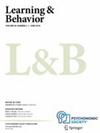倭黑猩猩知道你不知道:猿类无知归因。
IF 1.5
4区 心理学
Q3 BEHAVIORAL SCIENCES
引用次数: 0
摘要
Townrow和Krupenye (PNAS, 122(6), Article e2412450122,2025)发现倭黑猩猩理解他人的心理状态,并能将无知归因于社会伙伴。在一个优雅简单的设计中,作者发现,当一个社会伙伴不知道而不是知道隐藏食物的位置时,倭黑猩猩的交流更频繁、更迅速。本文章由计算机程序翻译,如有差异,请以英文原文为准。
Bonobos know when you don't: Ape ignorance attribution.
Townrow and Krupenye (PNAS, 122(6), Article e2412450122, 2025) found that bonobos understand the mental states of others and can attribute ignorance to a social partner. In an elegantly simple design, the authors found bonobos to communicate more often, and more quickly, when a social partner is ignorant, rather than knowledgeable, of the location of a hidden food item.
求助全文
通过发布文献求助,成功后即可免费获取论文全文。
去求助
来源期刊

Learning & Behavior
医学-动物学
CiteScore
2.90
自引率
5.60%
发文量
50
审稿时长
>12 weeks
期刊介绍:
Learning & Behavior publishes experimental and theoretical contributions and critical reviews concerning fundamental processes of learning and behavior in nonhuman and human animals. Topics covered include sensation, perception, conditioning, learning, attention, memory, motivation, emotion, development, social behavior, and comparative investigations.
 求助内容:
求助内容: 应助结果提醒方式:
应助结果提醒方式:


